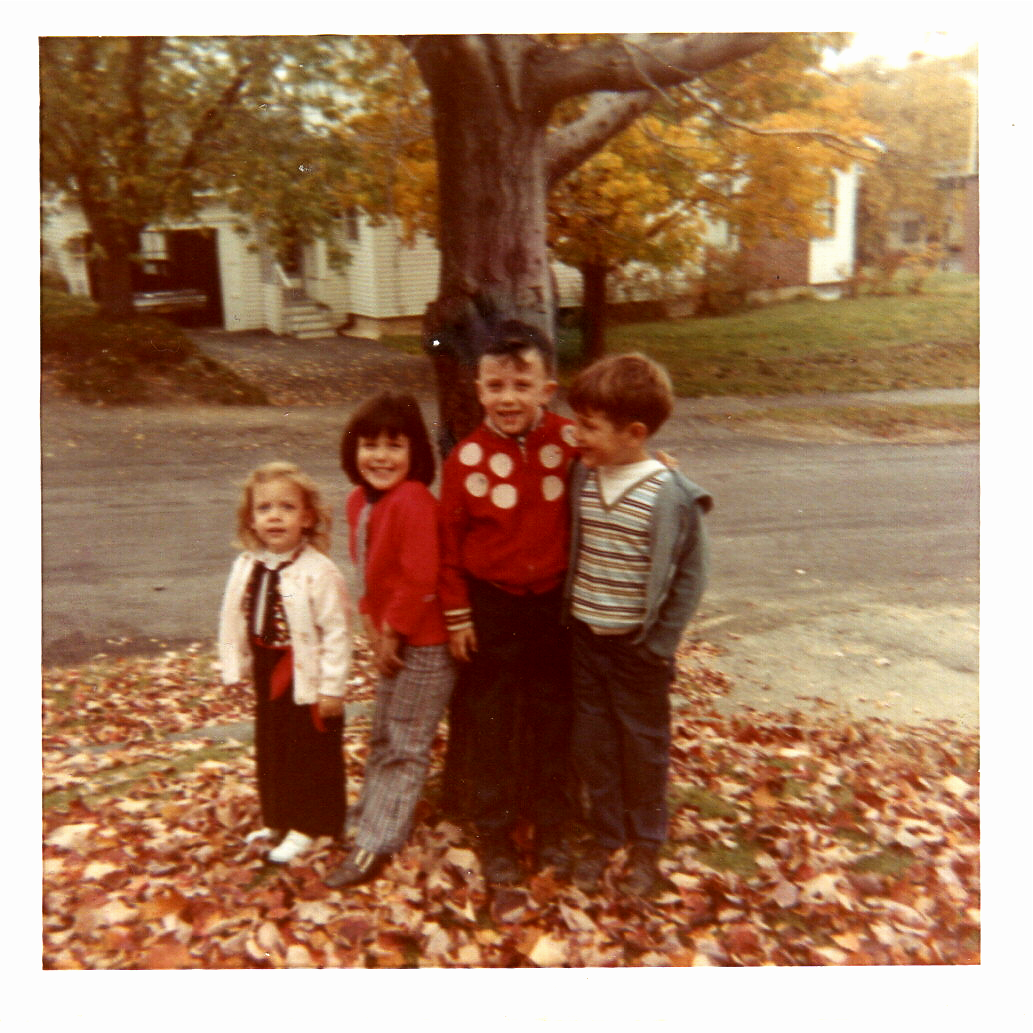
Late Nights and Bad Memories
It’s a gorgeous, sunny day with blue skies, white snow, and green trees out my window. The driveway could use some shoveling, so I’m sure I’ll be out in the fresh air before the dark descends around 5:00, which feels more hopeful than finding no sunlight at 4:30. We’re on our way up—nothing but longer days as far as the eye can see.
I almost placed an exclamation point at the end of that sentence, but I woke with a headache that’s still pounding in my temples, and an exclamation point would be like the banging of a gong tuned to a frequency higher than it should be.
Maybe my headache has to do with my late night. Sam, Jack, Stella, and I spend them together. Usually around midnight (we’ve stretched it out from 11:00 or 11:30 and should rein it back in), they turn off the PlayStation, Switch, or tablet; I put my computer to sleep; we head upstairs for jammies and teeth brushing; then come back down and meet on the couch in the family room. We open our books and read a few chapters. I usually close mine first and catch a few winks until they wake me because they’ve all decided it’s time to set the books aside. We pull out our rosaries and begin praying.
I was especially tired last night and managed to fall asleep and begin dreaming between the Glory Be for the fourth mystery and the intention for the fifth. Stella doesn’t know how I do it. I tell her I’ve had years of practice at being so tired I can drop off at the drop of a hat.
So, after all that, I was raring to get up to bed as soon as I had made the final sign of the cross and kissed each of the kids good-night. But, it was not to be. Jack’s blood sugar was low. Again. He had been munching Lifesavers throughout the last decade or two, and I asked him what the reading was. He didn’t know, because he hadn’t checked it, so I asked him to. 46. That’s low. He ate more Lifesavers, even though I wanted him to drink a Capri Sun. Then we started talking. None of us headed up to bed until 2:30. (It happens often with us, and I wouldn’t trade it for anything, no matter how heavy the conversation might get.)
Last night’s chat was not always pleasant, because I was encouraging Jack, yet again, to figure out what it is in his childhood that drives him to be so ruthless about lowering high blood sugars that he rebounds way too often with lows. My guess is that it has to do with feelings of powerlessness as a child.
How many of your own control issues stem from repressed memories/fears of being powerless? Hint: all of them. Childhood, almost by definition, involves being powerless. Whether it’s the inability to feed yourself, being dragged away from a favorite game because “It’s time for bed,” or getting imprisoned in school day after infinitely long day, children spend most of those “best years of their lives” with no means to control what happens to them. And most frustrating of all, they usually have no one to listen and understand and validate the feelings of sadness or anger that arise because they are unable to simply do what they want to do when they want to do it.
What happens to these feelings? They don’t go away. They’re like energy. They never disappear. They simply get transformed, like the force generated by your arms that moves into the pool cue, gets transferred to the cue ball, and then is dispersed among the 15 solid and striped balls that you just racked and broke.
Those undealt-with feelings of powerlessness cause you to micromanage your schedule or your employees or your diet when you reach adulthood. The house has to look just so, the eggs need to be scrambled with exactly twenty flicks of the whisk, or the blood sugar has to get lower AS SOON AS POSSIBLE. Worst of all, you become a parent hellbent on controlling your own child’s behavior, schedule, diet, clothing choices, words, whatever. But think about it: your children are human beings, and we don’t control other human beings. We try to, all the time. It’s why men design skimpy, sexy clothing for women; why husbands tell their wives that they can’t get a new refrigerator even though the husband is buying another toy for himself; why dictators dehumanize people before they enslave or kill them. OBJECTS can be controlled, not persons, but when we’re scared (of women, of not having enough money to get what we want, of losing political power) we grab for control, working damn hard to turn those people into objects, whether we recognize it or not.
What happens, though, when working so hard to stay in control simply gets to be too much? When the restrictive diet gets to be too hard, when the temptation of those brownies overwhelms you? You give in and give up—until something stops you short or you hit rock bottom and say, once again, “No more.” You start a new diet, or the same diet but with better intentions and the right mindset this time. Maybe you lose 50 pounds and are floating on air. You think you’ve finally done it. You’ve hit that goal, you feel great, and all is finally well. Until it isn’t. And the cycle goes round and round and round again. Why? Because you never dealt with the fears that are all tied up in the childhood trauma, those feelings of powerlessness, the notion that your parents might stop loving you if you fail.
Ooh. That hits hard, doesn’t it? Or does it? Maybe you’ve buried that fear so deeply you think that it doesn’t apply to you at all. Okay. We’ll just leave it there for now.
Would your parents ever stop loving you? Of course not. Parental love is unconditional, right? Right? Well, that’s what we’re told, but do our bodies believe it? When your mother is yelling like a banshee and throwing away your toys because THIS HOUSE IS A PIGSTY AND YOU NEVER PUT YOUR STUFF AWAY NO MATTER HOW MANY TIMES I ASK YOU TO, are you really sure that she loves you unconditionally? When your father shakes his head and scowls as he reviews your report card, with that big red F next to English, then just walks away, or says something like, “You know what is expected of you,” are you positive that he loves you unconditionally?
A child does not understand intentions; often a child doesn’t even understand words, or at least, the meaning behind them. A child understands actions. If my mother and father gave me dirty looks, scolded me, or punished me when I did something they deemed wrong (something I was unlikely to understand was wrong), but hugged and kissed me and said comforting, nice things to me when I behaved myself, how was I to think anything other than, They love me only when I’m good? Therefore, if I want to be loved, I have to be good.
My voice still catches in my throat and I find it hard to get the words out when I tell the following story. My mother died of cancer in 2005, three years after my father died of cancer. For a long time after Mom’s death, I stayed in touch with Judy, the woman who lived next door to us in Millinocket. In fact, she had stayed with my mother after her first minor surgery, to place a stent to open the duct that was being blocked by the tumor in Mom’s pancreas. One day, when Judy and I were talking after Mom died, she told me that my mother had been incredibly proud of me. Judy said that she had told her that I was a great mother and she was thankful that her grandchildren had such good parents. These words were a shock to me. All I had ever heard from my mother were things like, “Why did you buy this house? I hate it;” or “Cheryl, don’t let her get away with that behavior;” or “You’re pregnant again? You can’t handle the kids you have now;” or some other form of “You’re doing it wrong.”
I know. You’re thinking, “How awful! What kind of woman was she?” Well, she was probably a lot like your own mother. Oh. Does that change anything? Does it make you wonder why I seem to think I was traumatized as a child? After all, I was never physically or sexually abused. Sure, I got spanked once in a while, but I probably deserved it, right? Wrong. My parents were the adults. They were the ones who were supposed to be in control of their behavior. They were the ones who were supposed to deal with issues in a mature manner. And I’m sorry, but suddenly yelling at your kids or spanking them because YOU have finally reached your limit is no different from a child throwing a tantrum because they’ve reached theirs.
But emotions need to be dealt with, right? They need to be expressed. As I wrote in an earlier post, we have no control over the emotions our bodies produce. They do it automatically after every experience and trying to suppress them is wrong. All that does is make them fester. It sweeps them into a corner of your soul where they go unseen and get added to until the smallest thing acts as a spark to set that disregarded pile of bone-dry emotions ablaze.
If you were my children, you had to live through the spark getting struck when your mother walked into the house after an Easter Mass spent standing because all the people who can’t be bothered to go to church at any other time of year took all the seats. She was hungry and stressed and frustrated and berating herself for feeling this way because a good Catholic like So-and-So is loving and kind and charitable, happy that these delinquents have made at least some effort. She’s certainly not at her best, and when she walks into the house and sees toys strewn about the living room, she goes crazy and literally begins shoveling them—your own toys, that you love!—into the construction dumpster in front of your house. What do you do? You stand paralyzed, crying and bereft over that book you’ll never read again and the stuffed animal you desperately want in your arms right now. But then, you think fast, and every time your mother steps out the door with a shovelful, yelling and screaming all the while, you race around, still crying but more clearheaded, and grab anything you can get your hands on, whether it belongs to you or your brother, and you squirrel it away in your room before she comes back in and catches you.
Can you even imagine? The memory of it makes me so ashamed, I just want to curl up and cry. I’ve apologized to my kids for that Easter from hell. I’ve shared with them, more than once, what I finally figured out was driving such behavior, but I’ve told them that they absolutely DO NOT NEED TO FORGIVE ME. They shouldn’t. They should be remembering how they felt that day, and they should be crying and yelling at me and telling me how awful I was, how powerless I made them feel, how much I terrified them. Only by expressing the feelings I caused in them with my monstrous behavior will they heal and go on to become parents who don’t do these things to their own children. Only by doing this sort of soul work, will my children put the fears and compulsions behind them—and Jack will no longer think that he deserves to be punished if he doesn’t control his blood sugar well enough.




